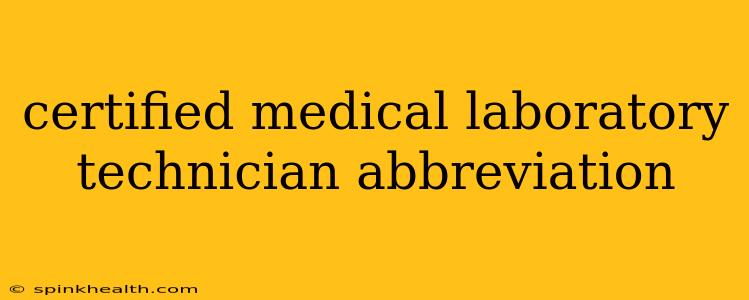Decoding the Alphabet Soup: Understanding the Certified Medical Laboratory Technician Abbreviation
The world of healthcare is full of abbreviations. For those outside the field, it can feel like navigating a dense forest of acronyms. Today, we're tackling one specifically: the abbreviation for Certified Medical Laboratory Technician. But before we reveal the answer, let's delve into the fascinating world of medical laboratory technicians and why their certification matters.
Imagine a bustling hospital, a silent hum of activity in the background. Doctors are making rounds, nurses are attending to patients, and in the heart of it all, the medical laboratory technicians are working tirelessly behind the scenes. They are the unsung heroes, diligently analyzing blood samples, tissue cultures, and other specimens, providing crucial information that guides diagnosis and treatment. Their work is precise, demanding, and vital to patient care.
The accuracy and reliability of their findings are paramount, which is why certification holds so much weight. It demonstrates a commitment to excellence, a rigorous standard of training, and a dedication to providing high-quality results. So, what's the coveted abbreviation that signifies this dedication?
What is the abbreviation for a Certified Medical Laboratory Technician?
The most common abbreviation for a Certified Medical Laboratory Technician is CLT. You might also encounter CMLT, though CLT is more prevalent. Both refer to a professional who has met the required educational and certification standards set by recognized certifying bodies.
What are the educational requirements to become a CLT?
This is a crucial question for anyone considering a career as a medical laboratory technician. The path to certification varies slightly depending on the specific certifying body and location. However, a common thread is the completion of an accredited educational program. This usually involves:
- An Associate's Degree: Many CLTs earn an Associate's Degree in Medical Laboratory Technology (MLT) or a closely related field.
- On-the-Job Training: Some individuals gain experience through on-the-job training programs combined with additional coursework. This approach often leads to certification as well.
What are the benefits of being a certified Medical Laboratory Technician (CLT)?
Certification is more than just a title; it's a testament to a professional's competence. The benefits extend beyond personal satisfaction. Being a CLT typically translates to:
- Increased Job Opportunities: Employers often prioritize certified candidates, widening career prospects.
- Higher Earning Potential: Certification can command higher salaries compared to uncertified technicians.
- Enhanced Professional Credibility: The CLT credential distinguishes a technician as highly qualified and trustworthy.
- Improved Patient Safety: By adhering to rigorous standards, CLTs contribute to safer and more effective patient care.
How can I find a certified medical laboratory technician?
Finding a qualified CLT isn't as difficult as you might think. Most reputable medical facilities and laboratories employ certified technicians. If you're a patient needing lab work, you can usually inquire about the qualifications of the technicians performing your tests. The laboratory itself should be able to provide you with this information.
What organizations offer CLT certification?
Several organizations offer certification for medical laboratory technicians. Each has its own specific requirements and procedures. It's essential to research and choose the certification that aligns best with your career goals and location.
In the world of healthcare, precision and accuracy are paramount. Medical laboratory technicians, particularly those holding the CLT credential, are at the forefront of ensuring that standards are met, and patients receive the best possible care. The simple abbreviation CLT represents a wealth of knowledge, skill, and dedication to the profession.

